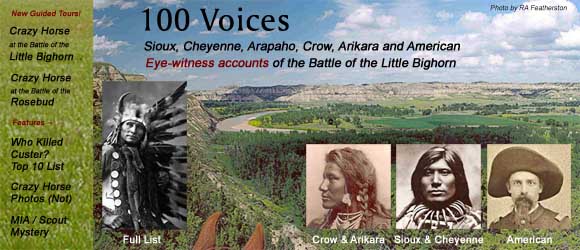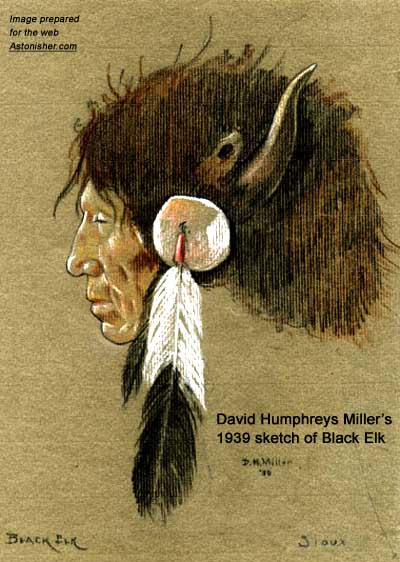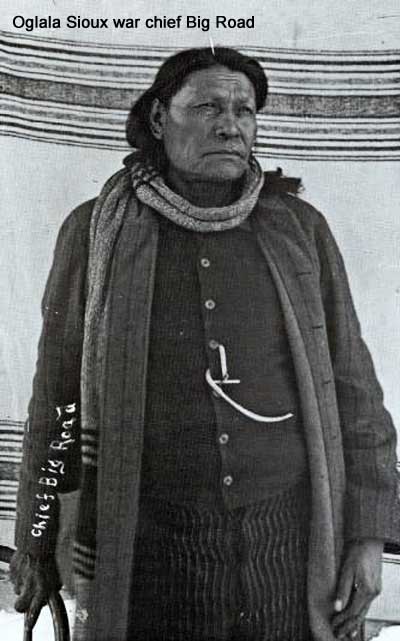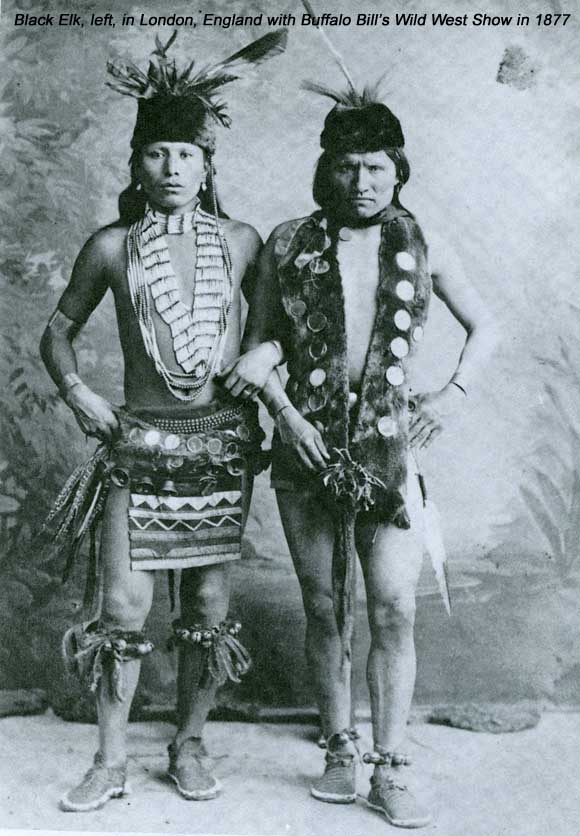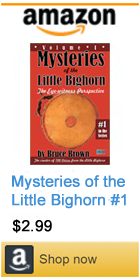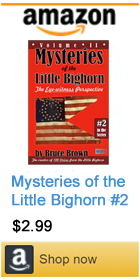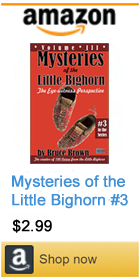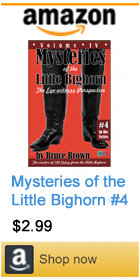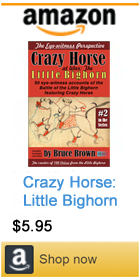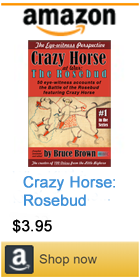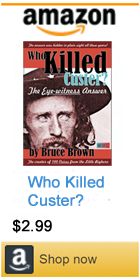|
|||||||
Bruce Brown's 100 Voices... Black Elk's Story of the Battle, #1
We were a small band, and we started in the night and traveled fast. Before we got to War Bonnet Creek, some Shyelas (Cheyennes) joined us, because their hearts were bad like ours and they were going to the same place. Later I learned that many small bands were doing the same thing and coming together from everywhere. Just after we camped on the War Bonnet, our scouts saw a wagon train of the Wasichus coming up the old road that caused the trouble before. They had oxen hitched to their wagons and they were part of the river of Wasichus that was running into the Black Hills. They shot at our scouts, and we decided we would attack them. When the war party was getting ready, I made up my mind that, small as I was, I might as well die there, and if I did, maybe I'd be known. I told Jumping Horse, a boy about my age, that I was going along to die, and he said he would too. So we went, and so did Crab and some other boys. When the Wasichus saw us coming, they put their wagons in a circle and got inside with their oxen. We rode around and around them in a wide circle that kept getting narrower. That is the best way to fight, because it is hard to hit ponies running fast in a circle. And sometimes there would be two circles, one inside the other, going fast in opposite directions, which made us still harder to hit. The cavalry of the Wasichus did not know how to fight. They kept together, and when they came on, you could hardly miss them. We kept apart in the circle. While we were riding around the wagons, we were hanging low on the outside of the ponies and shooting under their necks. This was not easy to do, even when your legs were long, and mine were not yet very long. But I stuck tight and shot with the six-shooter my aunt gave me. Before we started the attack I was afraid, but Big Man told us we were brave boys, and I soon got over being frightened. The Wasichus shot fast at us from behind the wagons, and I could hear bullets whizzing, but they did not hit any of us. I kept thinking of my vision, and maybe that helped. I do not know whether we killed any Wasichus or not. We rode around several times, and once we got close, but there were not many of us and we could not get at the Wasichus behind their wagons; so we went away. This was my first fight. When we were going back to camp, some Shyela warriors told us we were very brave boys, and that we were going to have plenty of fighting. We were traveling very fast now, for we were in danger and wanted to get back to Crazy Horse. He had moved over west to the Rosebud River, and the people were gathering there. As we traveled, we met other little bands all going to the same place, until there was a good many of us all mixed up before we got there. Red Cloud's son (Jack Red Cloud) was with us, but Red Cloud stayed at the Soldiers' Town.
About the middle of the Moon of Making Fat (June) the whole village moved a little way up the River to a good place for a sun dance. The valley was wide and flat there, and we camped in a great oval with the river flowing through it, and in the center they built the bower of branches in a circle for the dancers, with the opening of it to the east whence comes the light. Scouts were sent out in all directions to guard the sacred place. Sitting Bull, who was the greatest medicine man of the nation at that time, had charge of this dance to purify the people and to give them power and endurance. It was held in the Moon of Fatness because that is the time when the sun is highest and the growing power of the world is strongest. I will tell you how it was done. First a holy man was sent out all alone to find the waga chun, the holy tree that should stand in the middle of the dancing circle. Nobody dared follow to see what he did or hear the sacred words he would say there. And when he had found the right tree, he would tell the people, and they would come there singing, with flowers all over them. Then when they had gathered about the holy tree, some women who were bearing children would dance around it, because the Spirit of the Sun loves all fruitfulness. After that a warrior, who had done some very brave deed that summer, struck the tree, counting coup upon it; and when he had done this, he had to give gifts to those who had least of everything, and the braver he was, the more he gave away. After this, a band of young maidens came singing, with sharp axes in their hands; and they had to be so good that nobody there could say anything against them, or that any man had ever known them; and it was the duty of any one who knew anything bad about any of them to tell it right before all the people there and prove it. But if anybody lied, it was very bad for him. The maidens chopped the tree down and trimmed its branches off. Then chiefs, who were the sons of chiefs, carried the sacred tree home, stopping four times on the way, once for each season, giving thanks for each. Now when the holy tree had been brought home but was not yet set up in the center of the dancing place, mounted warriors gathered around the circle of the village, and at a signal they all charged inward upon the center where the tree would stand, each trying to be the first to touch the sacred place; and whoever was the first could not be killed in war that year. When they all came together in the middle, it was like a battle, with the ponies rearing and screaming in a big dust and the men shouting and wrestling and trying to throw each other off the horses. After that there was a big feast and plenty for everybody to eat, and a big dance just as though we had won a victory. The next day the tree was planted in the center by holy men who sang sacred songs and made sacred vows to the Spirit. And the next morning nursing mothers brought their holy little ones to lay them at the bottom of the tree, so that the sons would be brave men and the daughters the mothers of brave men. The holy men pierced the ears of the little ones, and for each piercing the parents gave away a pony to some one who was in need. The next day the dancing began, and those who were going to take part were ready, for they had been fasting and purifying themselves in the sweat lodges, and praying. First, their bodies were painted by the holy men. Then each would lie down beneath the tree as though he were dead, and the holy men would cut a place in his back or chest, so that a strip of rawhide, fastened to the top of the tree, could be pushed through the flesh and tied. Then the men would get up and dance to the drums, leaning on the rawhide strip as long as he could stand the pain or until the flesh tore loose. We smaller boys had a good time during the two days of dancing, for we were allowed to do almost anything to tease the people, and they had to stand it. We would gather sharp spear grass, and when a man came along without a shirt, we would stick him to see if we could make him cry out, for everybody was supposed to endure everything. Also we made pop-guns out of young ash boughs and shot at the men and women to see if we could make them jump; and if they did, everybody laughed at them. The mothers carried water to their holy little ones in bladder bags, and we made little bows and arrows that we could hide under our robes so that we could steal up to the women and shoot holes in the bags. They were supposed to stand anything and not scold us when the water spurted out. We had a good time there. Right after the sun dance was over, some of our scouts came in from the south, and the crier went around the circle and said: "The scouts have returned and they have reported that soldiers are camping up the river. So, young warriors, take courage and get ready to meet them." While they were all getting ready, I was getting ready too, because Crazy Horse was going to lead the warriors and I wanted to go with him; but my uncle, who thought a great deal of me, said: "Young nephew, you must not go. Look at the helpless ones. Stay home, and maybe there will be plenty of fighting right here." So the war parties went on without me. Maybe my uncle thought I was too little to do much and might get killed. Then the crier told us to break camp, and we moved over west towards the Greasy Grass and camped at the head of Spring Creek while the war parties were gone. We learned later that it was Three Stars who fought with our people on the Rosebud that time. He had many walking soldiers and some cavalry, and there were many Crows and Shoshones with him. They were all coming to attack us where we had the sun dance, but Crazy Horse whipped them and they went back to Goose Creek where they had all their wagons. My friend, Iron Hawk, was there that day, and he can tell you how it was. Black Elk Speaks: The Life Story of a Holy Man of the Ogalala Sioux, by John G. Neihardt (Flaming Rainbow), p 70 - 76
Black Elk was Crazy Horse's cousin. Although Black Elk was only 13, he took two scalps in the Battle of the Little Bighorn. Black Elk surrendered with Crazy Horse's band at Ft. Robinson in May 1877. Here is another account of the battle by Black Elk.
|
|||||||



